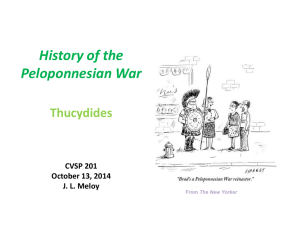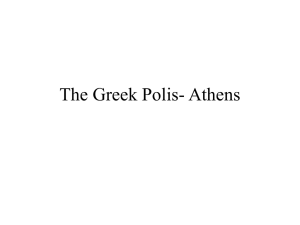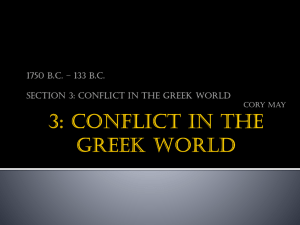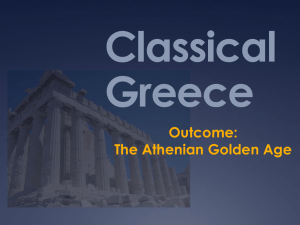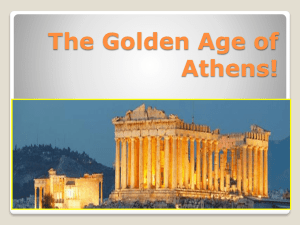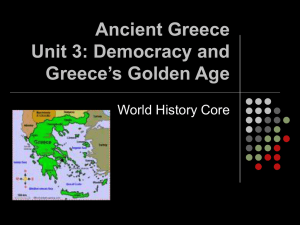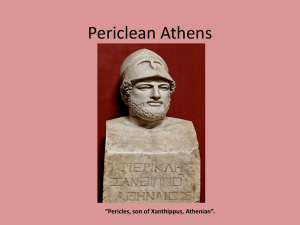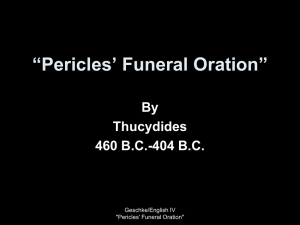The Peloponessian War 431 – 404 B.C.
advertisement
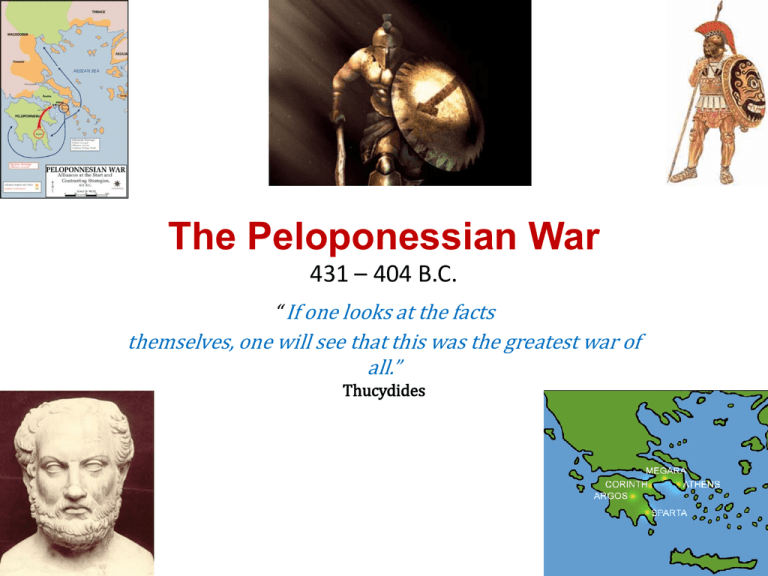
The Peloponessian War 431 – 404 B.C. “ If one looks at the facts themselves, one will see that this was the greatest war of all.” Thucydides The Peloponnesian War 431 – 404 B.C. The Archdamian War (431 – 421 B.C.) Peace of Nicias Sicilian Expedition 415 B.C. The Sicilian War The Ionian/ Decelean War (413 – 404 B.C.) Oligarchic Coup of Athens (411 B.C.) Defeat of Athens & End of Delian League (404 B.C.) Contents • • • • • • • • • • • • • • Historical Background Thirty Years’ Peace * Greek World 431 B.C. * Spartan Society * Athenian Society Clash of Cultures? * Pericles * Declaration of War Battle of Sybota* The Potidaean Affair Cleon Alcibiades The Great Plague Death of Pericles The Archdamian War (431 – 421 B.C.) Peace of Nicias Sicilian Expedition 415 B.C. The Sicilian War The Ionian/ Decelean War (413 – 404 B.C.) Oligarchic Coup of Athens (411 B.C.) Defeat of Athens & End of Delian League (404 B.C.) Historical Background • Both Athens and Sparta had grown as empires throughout the latter part of the 6th Century B.C. and early 5th Century B.C. • The First Peloponnesian War had broken out in 460 B.C. as a result of Empires & Alliances Athens: Delian League Sparta: Peloponnesian League • Phlius • Orneae • Megara • Elis • Mantinea • Thebes • Corinth Thirty Years’ Peace • Signed between Athens & Sparta in 445 B.C. which brought the First Peloponnesian War to an end. Lasted only 13 years. • Arbitration was codified as a necessary precursor to any conflict between the two. • Recognised both empires (alliances) as legitimate • Allowed neutral city-states & regions to join either alliance, but none could switch alliances • Neither alliance could interfere with other’s allies • Athens had to give up a few territories, including Megarian ports The Greek World 431 B.C. Athens & Port of Piraeus Clash of Cultures or Hellenistic Power Struggle? • • • • • • Athens Leader of the Delian League Democratic * Semi-Liberal Cosmopolitan Cultured & Artistic Maritime Empire Diverse Trade Links • • • • • • Sparta Leader of the Peloponnesian League Oligarchic Ultra-Conservative, Militaristic Society Insular & Isolationist Superstitious & Patriarchal Land Power Homogenistic Spartan Society An Oligarchic Complexity King King Gerousia: Council of 28 Spartans Traders & manufacturers Perioikoi “like someone sitting in wait for disasters to strike the Spartans” Helots Aristotle They would gladly eat the Spartans raw” Xenophon “most institutions among the Spartans have always been established with regard to security against the Helots” Thucydides Sparta • ‘Mixed constitution’; containing monarchic, oligarchic & democratic elements Sparta’s Allies: The Peloponnesian League Athenian Society: •Cosmopolitan, mixed, democratic society •Literature, arts and evolution of 'free thinking': Socrates Since the ascent of Pericles, Athenian democracy had taken on a more ambitious, outward-looking zeal The Delian League • Founded in early 5th Century B.C. to resist the Persian threat. Other city states joined. • Treasury initially located in Delos • Members gave money (not ships) to combine their efforts in resisting Persian threat • Treasury moved to Athens in 454 B.C. • Monies were used to strengthen the military (naval) power of Athens and also used to aid the construction of the Parthenon Pericles’ Building Programme Pericles initiated an ambitious building programme in 455 B.C. “Future ages will wonder at us, as the present age wonders at us now.” “Just because you do not take an interest in politics doesn't mean politics won't take an interest in you” “We do not imitate, but are a model to others” Pericles 495 – 429 B.C. “Freedom is the sure possession of those alone who have the courage to defend it” Pericles • • • • • • • • Became leader of Athens in 461 B.C. establishing a popular vote in the Athenian Assembly which ultimately resulted in the exile of the Athenian leader, Cimon. A patron of the arts Hostile to Sparta Led the ambitious building programme of Athens – resulting in the timeless architectures of the Parthenon and the Acropolis Ambitious, democratic and a great orator Founded many of the democratic institutions of Athens Led the mission to recapture Delphi from the Spartans in 448 B.C. and the invasion of Samos ‘Age of Pericles’ = 460 – 429 B.C. The Ecclesia The Ecclesia: Pynx Here at the 'Pynx', usually about 6,000 Athenians would voted directly on Athenian policy, law and elect the 'strategoi' Pericles democratic reforms of 452-451 allowed for payment of jurors, thereby opening up attendance to almost all levels of society. The Ecclesia usually met about forty times a year, deciding on public honours, ratifying peace agreements or declarations of war, electing strategoi, public construction, bestowal of honours etc. Corcyra & Corinth: Emissaries in Athens Corcyra • “A victim to the injustice of others” • “your welcome of us under these circumstances will be a proof of goodwill which will ever keep alive the gratitude you will lay up in our hearts.” • “yourselves excepted, we are the greatest naval power in Hellas” • “a power that comes in quest of assistance being in a position to give to the people whose alliance she solicits as much safety and honour as she will receive” Corinth • “Corinth is at least in treaty with you; with Corcyra you were never even in truce.” • “Why, if you make it your policy to receive and assist all offenders, you will find that just as many of your dependencies will come over to us, and the principle that you establish will press less heavily on us than on yourselves” • “When you were in want of ships of war for the war against the Aeginetans, before the Persian invasion, Corinth supplied you with twenty vessels.” Corinth v. Corcyra: Battle of Sybota 433 B.C. • Athens receives emissaries from both Corinth & Corcyra over dispute • Corcyra appeals for Athenian help BUT Corinth warns Athens of any involvement in internal Corinthian affairs • Athens decides to help Corcyra, albeit in a defensive posture, sending ten ships to aid her defence. Just as the Corinthians were about to defeat Corcyra, a further 20 Athenian triremes arrived to bolster their defense. • When questioned by Corinthians, Athenians steadfastly declare their willingness to defend Corcyra. • Both Corinth & Sparta interpret this as a breach of the Thirty Years’ Peace treaty. Battle of Sybota 433 B.C. Significance: 1)Known as the ‘first grievance’ between the Athenians & Spartans 2)Athenian response to Corinthian delegation at the Battle of Sybota: "Neither are we beginning war, Peloponnesians, nor are we breaking the treaty; but these Corcyraeans are our allies, and we are come to help them. So if you want to sail anywhere else, we place no obstacle in your way; but if you are going to sail against Corcyra, or any of her possessions, we shall do our best to stop you." 3)Both sides claimed victory in this battle. Pericles’ Funeral Oration Pericles’ Funeral Oration • In this funeral oration for the Athenian soldiers, Pericles makes his famous speech concerning the virtues of Athens, it’s citizens and their way of life. • Pericles describes Athens as a “model to others” rather than an imitator. • Pericles places Athens’ strength in its citizens, their character being a reflection of the society they inhabit. • Pericles also makes subtle references to Sparta and the regressive nature of their military strength. • Pericles extols the courage of the dead Athenians, imploring others to take their place to secure Athens’ destiny as the greatest, and most forwardthinking state in the Hellenic world. Thucydides: Pericles •“For as long as he was prominent in the city in peace-time he guided with moderation and preserved her in safety, and in his time she became very great...The fact is that he retained the power of his influence by reason of his reputation, the quality of his mind, and his utter integrity, and so was able to restrain his fellow-citizens by his moderation, free though they were: he was not led by the Many, he led them” The City of Epidamnus Spartan Declaration of War The Potidaean Revolt 432 B.C. • Colony of Corinth but a tributary ally of Athens.* • Three Phases of War • The Archdamian War 431 – 421 B.C. • The Sicilian War • The Ionian/ Declean War The Archdamian War 431 – 421 B.C. 431 – Outbreak of Plague in Athens 429 - Siege at Plataea - Death of Pericles 428 – Revolt of Mytilene 427 – Debate of Mytilene 426 – Battle of Olpae 425 – Battle of Pylos & Sphacteria 424 – Battle of Delium 422 – Battle of Amphipolis 421 – Peace of Nicias Siege at Plataea 429 B.C. "If we begin the war in haste, we'll have many delays before we end it, owing to our lack of preparation." - King Archidamus II (Sparta) Siege at Plataea 429 B.C. Archidamus beseiged the twon of Plataea, which only consisted of 800 citizens and 85 Athenians The Plataeans resisted courageously & Archidamus resorted to starving the city out Eventually, about half of the population escaped, but the other half eventually surrendered These were brought before a Spartan court, where they were asked simply "Whether, during the present war, they had rendered any assistance to the Lacedaemonians and their allies?" These 200 citizens & 25 Athenians were then executed. This is seen as one of the overt causes of the Peloponnesian War Thucydides Account: Plataea "the treaty had now been broken by an overt act after the affair at Plataea" "Athens and Lacedaemon now resolved to send embassies to the King and to such other of the barbarian powers as either party could look to for assistance." Periclean Strategy: Tactical Land Retreat & Naval War Pericles convinced his people to perform a tactical retreat behind the walls of Athens, supported and supplied by their powerful fleet through the port of Peiraeus Of a total population of 172,000, only 60,000 citizens lived within the city “..the upheaval was a harsh experience, for most of them had always been accustomed to live in the country...in their grave depression they took it badly that they were abandoning their homes and the shrines that had been theirs traditionally from the very earliest days of the community, and that they were about to change their style of life.” The Great Plague Effects of the Plague: Pericles' Strategic Flaw Pericles' strategy had depended on the Athenian Navy protecting their supply ships to the Port of Pireus This strategy proved to be their undoing; as the surrounding population of Attica retreated behind the walls of Athens, the over-crowding would contribute to the disease The supply ships apparently brought the plague with them and the whole city of Athens, walled in, became a hot-bed of disease As the disease spread, Thucydides writes of the physical, social and moral decay that beset the city. In his account, we see Thucydides depart from his usual scientific, dispassioned accounts. Thucydides: Effects of the Plague Physical: “discharges of bile of every kind named by physicians ensued, accompanied by very great distress...internally it burned so that the patient could not bear to have on him clothing or linen even of the very lightest description; or who plunged into the raintanks in their agonies of unquenchable thirst..... for it settled in the privy parts, the fingers and the toes, and many escaped with the loss of these, some too with that of their eyes” Thucydides: Effects of the Plague Social: “the bodies of dying men lay one upon another, and half-dead creatures reeled about the streets and gathered round all the fountains in their longing for water.... sacred places also in which they had quartered themselves were full of corpses of persons that had died there...... for as the disaster passed all bounds, men, not knowing what was to become of them, became utterly careless of everything, whether sacred or profane.... they threw their own dead body upon the stranger's pyre and ignited it; sometimes they tossed the corpse which they were carrying on the top of another that was burning, and so went off....” Thucydides: Effects of the Plague Moral: “Men now coolly ventured on what they had formerly done in a corner, and not just as they pleased, seeing the rapid transitions produced by persons in prosperity suddenly dying and those who before had nothing succeeding to their property..... they resolved to spend quickly and enjoy themselves, regarding their lives and riches as alike things of a day..... it was settled that present enjoyment, and all that contributed to it, was both honourable and useful..... Fear of gods or law of man there was none to restrain them..... As for the first, they judged it to be just the same whether they worshipped them or not, as they saw all alike perishing; and for the last, no one expected to live to be brought to trial for his offences, but each felt that a far severer sentence had been already passed upon them all and hung ever over their heads, and before this fell it was only reasonable to enjoy life a little.” Death of Pericles 429 B.C.
